formerly eScholarship Editions


|
|
|
|
Your request for similar items found 20 book(s). | Modify Search | Displaying 1 - 20 of 20 book(s) | |
| 1. | 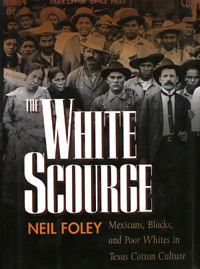 | Title: The white scourge: Mexicans, Blacks, and poor whites in Texas cotton culture Author: Foley, Neil Published: University of California Press, 1998 Subjects: History | Ethnic Studies | American Studies Publisher's Description: In a book that fundamentally challenges our understanding of race in the United States, Neil Foley unravels the complex history of ethnicity in the cotton culture of central Texas. This engrossing narrative, spanning the period from the Civil War through the collapse of tenant farming in the early 1940s, bridges the intellectual chasm between African American and Southern history on one hand and Chicano and Southwestern history on the other. The White Scourge describes a unique borderlands region, where the cultures of the South, West, and Mexico overlap, to provide a deeper understanding of the process of identity formation and to challenge the binary opposition between "black" and "white" that often dominates discussions of American race relations.In Texas, which by 1890 had become the nation's leading cotton-producing state, the presence of Mexican sharecroppers and farm workers complicated the black-white dyad that shaped rural labor relations in the South. With the transformation of agrarian society into corporate agribusiness, white racial identity began to fracture along class lines, further complicating categories of identity. Foley explores the "fringe of whiteness," an ethno-racial borderlands comprising Mexicans, African Americans, and poor whites, to trace shifting ideologies and power relations. By showing how many different ethnic groups are defined in relation to "whiteness," Foley redefines white racial identity as not simply a pinnacle of status but the complex racial, social, and economic matrix in which power and privilege are shared.Foley skillfully weaves archival material with oral history interviews, providing a richly detailed view of everyday life in the Texas cotton culture. Addressing the ways in which historical categories affect the lives of ordinary people, The White Scourge tells the broader story of racial identity in America; at the same time it paints an evocative picture of a unique American region. This truly multiracial narrative touches on many issues central to our understanding of American history: labor and the role of unions, gender roles and their relation to ethnicity, the demise of agrarian whiteness, and the Mexican-American experience. [brief] Similar Items |
| 2. | 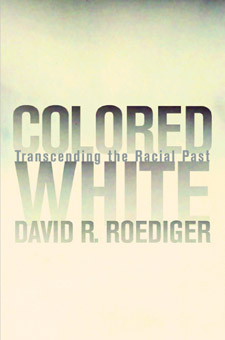 | Title: Colored White: transcending the racial past Author: Roediger, David R Published: University of California Press, 2002 Subjects: Ethnic Studies | African American Studies | United States History | Immigration Publisher's Description: David R. Roediger's powerful book argues that in its political workings, its distribution of advantages, and its unspoken assumptions, the United States is a "still white" nation. Race is decidedly not over. The critical portraits of contemporary icons that lead off the book--Rush Limbaugh, Bill Clinton, O.J. Simpson, and Rudolph Giuliani--insist that continuities in white power and white identity are best understood by placing the recent past in historical context. Roediger illuminates that history in an incisive critique of the current scholarship on whiteness and an account of race-transcending radicalism exemplified by vanguards such as W.E.B. Du Bois and John Brown. He shows that, for all of its staying power, white supremacy in the United States has always been a pursuit rather than a completed project, that divisions among whites have mattered greatly, and that "nonwhite" alternatives have profoundly challenged the status quo. Colored White reasons that, because race is a matter of culture and politics, racial oppression will not be solved by intermarriage or demographic shifts, but rather by political struggles that transform the meaning of race--especially its links to social and economic inequality. This landmark work considers the ways that changes in immigration patterns, the labor force, popular culture, and social movements make it possible--though far from inevitable--that the United States might overcome white supremacy in the twenty-first century. Roediger's clear, lively prose and his extraordinary command of the literature make this one of the most original and generative contributions to the study of race and ethnicity in the United States in many decades. [brief] Similar Items |
| 3. | 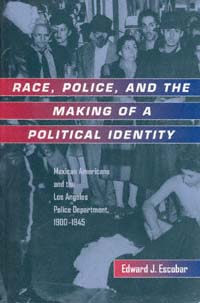 | Title: Race, police, and the making of a political identity: Mexican Americans and the Los Angeles Police Department, 1900-1945 Author: Escobar, Edward J 1946- Published: University of California Press, 1999 Subjects: History | California and the West | Latin American History | Latino Studies | Social Problems | Politics | Californian and Western History | Urban Studies | Criminology | Criminology Publisher's Description: In June 1943, the city of Los Angeles was wrenched apart by the worst rioting it had seen to that point in the twentieth century. Incited by sensational newspaper stories and the growing public hysteria over allegations of widespread Mexican American juvenile crime, scores of American servicemen, joined by civilians and even police officers, roamed the streets of the city in search of young Mexican American men and boys wearing a distinctive style of dress called a Zoot Suit. Once found, the Zoot Suiters were stripped of their clothes, beaten, and left in the street. Over 600 Mexican American youths were arrested. The riots threw a harsh light upon the deteriorating relationship between the Los Angeles Mexican American community and the Los Angeles Police Department in the 1940s.In this study, Edward J. Escobar examines the history of the relationship between the Los Angeles Police Department and the Mexican American community from the turn of the century to the era of the Zoot Suit Riots. Escobar shows the changes in the way police viewed Mexican Americans, increasingly characterizing them as a criminal element, and the corresponding assumption on the part of Mexican Americans that the police were a threat to their community. The broader implications of this relationship are, as Escobar demonstrates, the significance of the role of the police in suppressing labor unrest, the growing connection between ideas about race and criminality, changing public perceptions about Mexican Americans, and the rise of Mexican American political activism. [brief] Similar Items |
| 4. | 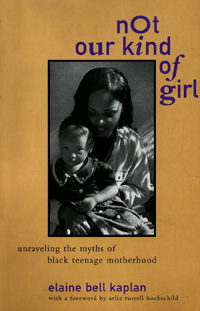 | Title: Not our kind of girl: unraveling the myths of Black teenage motherhood Author: Kaplan, Elaine Bell Published: University of California Press, 1997 Subjects: Social Science | Gender Studies | African American Studies Publisher's Description: One of the most worrisome images in America today is that of the teenage mother. For the African-American community, that image is especially troubling: All the problems of the welfare system seem to spotlight the black teenage mom. Elaine Bell Kaplan's affecting and insightful book dispels common perceptions of these young women. Her interviews with the women themselves, and with their mothers and grandmothers, provide a vivid picture of lives caught in the intersection of race, class, and gender.Kaplan challenges the assumption conveyed in the popular media that the African-American community condones teen pregnancy, single parenting, and reliance on welfare. Especially telling are the feelings of frustration, anger, and disappointment expressed by the mothers and grandmothers Kaplan interviewed. And in listening to teenage mothers discuss their problems, Kaplan hears first-hand of their misunderstandings regarding sex, their fraught relationships with men, and their difficulties with the educational system - all factors that bear heavily on their status as young parents.Kaplan's own experience as an African-American teenage mother adds a personal dimension to this book, and she offers substantial proposals for rethinking and reassessing the class factors, gender relations, and racism that influence black teenagers to become mothers. [brief] Similar Items |
| 5. | 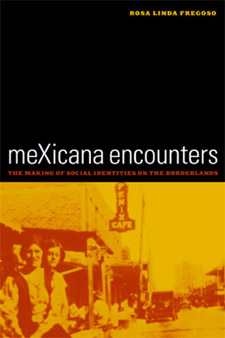 | Title: MeXicana encounters: the making of social identities on the borderlands Author: Fregoso, Rosa Linda Published: University of California Press, 2003 Subjects: Sociology | Chicano Studies | California and the West | Film | Women's Studies | Literary Theory and Criticism | Latin American Studies | American Studies Publisher's Description: meXicana Encounters charts the dynamic and contradictory representation of Mexicanas and Chicanas in culture. Rosa Linda Fregoso's deft analysis of the cultural practices and symbolic forms that shape social identities takes her across a wide and varied terrain. Among the subjects she considers are the recent murders and disappearances of women in Ciudad Juárez; transborder feminist texts that deal with private, domestic forms of violence; how films like John Sayles's Lone Star re-center white masculinity; and the significance of la familia to the identity of Chicanas/os and how it can subordinate gender and sexuality to masculinity and heterosexual roles. Fregoso's self-reflexive approach to cultural politics embraces the movement for social justice and offers new insights into the ways that racial and gender differences are inscribed in cultural practices. [brief] Similar Items |
| 6. | 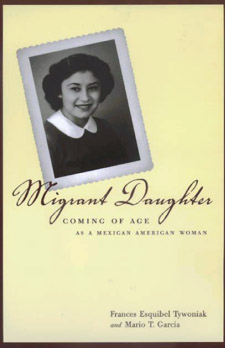 | Title: Migrant daughter: coming of age as a Mexican American woman Author: Tywoniak, Frances Esquibel 1931- Published: University of California Press, 2000 Subjects: Ethnic Studies | Women's Studies | Chicano Studies | California and the West | Californian and Western History | Autobiographies and Biographies Publisher's Description: Taking us from the open spaces of rural New Mexico and the fields of California's Great Central Valley to the intellectual milieu of student life in Berkeley during the 1950s, this memoir, based on an oral history by Mario T. García, is the powerful and moving testimonio of a young Mexican American woman's struggle to rise out of poverty. Migrant Daughter is the coming-of-age story of Frances Esquibel Tywoniak, who was born in Spanish-speaking New Mexico, moved with her family to California during the Depression to attend school and work as a farm laborer, and subsequently won a university scholarship, becoming one of the few Mexican Americans to attend the University of California, Berkeley, at that time. Giving a personal perspective on the conflicts of living in and between cultures, this eloquent story provides a rare glimpse into the life of a young Mexican American woman who achieved her dreams of obtaining a university education. In addition to the many fascinating details of everyday life the narrative provides, Mario T. García's introduction contextualizes the place and importance of Tywoniak's life. Both introduction and narrative illustrate the process by which Tywoniak negotiated her relation to ethnic identity and cultural allegiances, the ways in which she came to find education as a channel for breaking with fieldwork patterns of life, and the effect of migration on family and culture. This deeply personal memoir portrays a courageous Mexican American woman moving between many cultural worlds, a life story that at times parallels, and at times diverges from, the real life experiences of thousands of other, unnamed women. [brief] Similar Items |
| 7. | 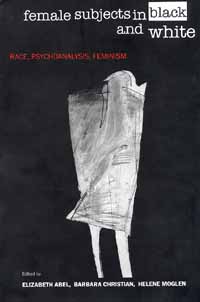 | Title: Female subjects in black and white: race, psychoanalysis, feminism Author: Abel, Elizabeth Published: University of California Press, 1997 Subjects: Literature | African American Studies | Gender Studies | Literary Theory and Criticism | American Literature | GayLesbian and Bisexual Studies Publisher's Description: This landmark collaboration between African American and white feminists goes to the heart of problems that have troubled feminist thinking for decades. Putting the racial dynamics of feminist interpretation center stage, these essays question such issues as the primacy of sexual difference, the universal nature of psychoanalytic categories, and the role of race in the formation of identity. They offer new ways of approaching African American texts and reframe our thinking about the contexts, discourses, and traditions of the American cultural landscape. Calling for the racialization of whiteness and claiming that psychoanalytic theory should make room for competing discourses of spirituality and diasporic consciousness, these essays give shape to the many stubborn incompatibilities - as well as the transformative possibilities - between white feminist and African American cultural formations.Bringing into conversation a range of psychoanalytic, feminist, and African-derived spiritual perspectives, these essays enact an inclusive politics of reading. Often explosive and always provocative, Female Subjects in Black and White models a new cross-racial feminism. [brief] Similar Items |
| 8. | 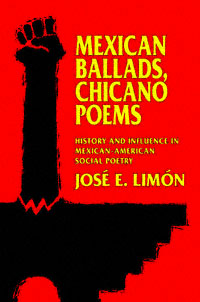 | Title: Mexican ballads, Chicano poems: history and influence in Mexican-American social poetry Author: Limón, José Eduardo Published: University of California Press, 1992 Subjects: Literature | Literary Theory and Criticism | American Literature | American Studies | Latin American History | Folklore and Mythology Publisher's Description: Mexican Ballads, Chicano Poems combines literary theory with the personal engagement of a prominent Chicano scholar. Recalling his experiences as a student in Texas, José Limón examines the politically motivated Chicano poetry of the 60s and 70s. He bases his analyses on Harold Bloom's theories of literary influence but takes Bloom into the socio-political realm. Limón shows how Chicano poetry is nourished by the oral tradition of the Mexican corrido , or master ballad, which was a vital part of artistic and political life along the Mexican-U.S. border from 1890 to 1930.Limón's use of Bloom, as well as of Marxist critics Raymond Williams and Fredric Jameson, brings Chicano literature into the arena of contemporary literary theory. By focusing on an important but little-studied poetic tradition, his book challenges our ideas of the American canon and extends the reach of Hispanists and folklorists as well. [brief] Similar Items |
| 9. | 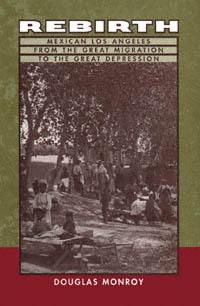 | Title: Rebirth: Mexican Los Angeles from the great migration to the Great Depression Author: Monroy, Douglas Published: University of California Press, 1999 Subjects: History | Latino Studies | United States History | California and the West Publisher's Description: This sweeping, vibrant narrative chronicles the history of the Mexican community in Los Angeles. Douglas Monroy unravels the dramatic, complex story of Mexican immigration to Los Angeles during the early decades of the twentieth century and shows how Mexican immigrants re-created their lives and their communities. Against the backdrop of this newly created cityscape, Rebirth explores pivotal aspects of Mexican Los Angeles during this time - its history, political economy, popular culture - and depicts the creation of a time and place unique in Californian and American history.Mexican boxers, movie stars, politicians, workers, parents, and children, American popular culture and schools, and historical fervor on both sides of the border all come alive in this literary, jargon-free chronicle. In addition to the colorful unfolding of the social and cultural life of Mexican Los Angeles, Monroy tells a story of first-generation immigrants that provides important points of comparison for understanding other immigrant groups in the United States.Monroy shows how the transmigration of space, culture, and reality from Mexico to Los Angeles became neither wholly American nor Mexican, but México de afuera , "Mexico outside," a place where new concerns and new lives emerged from what was both old and familiar. This extremely accessible work uncovers the human stories of a dynamic immigrant population and shows the emergence of a truly transnational history and culture. Rebirth provides an integral piece of Chicano history, as well as an important element of California urban history, with the rich, synthetic portrait it gives of Mexican Los Angeles. [brief] Similar Items |
| 10. | 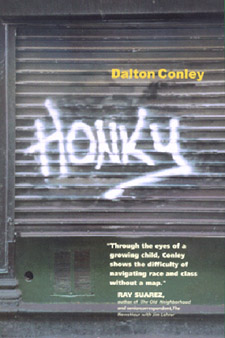 | Title: Honky Author: Conley, Dalton 1969- Published: University of California Press, 2000 Subjects: Sociology | Urban Studies | American Studies | Autobiography Publisher's Description: This intensely personal and engaging memoir is the coming-of-age story of a white boy growing up in a neighborhood of predominantly African American and Latino housing projects on New York's Lower East Side. Vividly evoking the details of city life from a child's point of view - the streets, buses, and playgrounds - Honky poignantly illuminates the usual vulnerabilities of childhood complicated by unusual circumstances. As he narrates these sharply etched and often funny memories, Conley shows how race and class shaped his life and the lives of his schoolmates and neighbors. A brilliant case study for illuminating the larger issues of inequality in American society, Honky brings us to a deeper understanding of the privilege of whiteness, the social construction of race, the power of education, and the challenges of inner-city life. Conley's father, a struggling artist, and his mother, an aspiring writer, joined Manhattan's bohemian subculture in the late 1960s, living on food stamps and raising their family in a housing project. We come to know his mother: her quirky tastes, her robust style, and the bargains she strikes with Dalton - not to ride on the backs of buses, and to always carry money in his shoe as protection against muggers. We also get to know his father, his face buried in racing forms, and his sister, who in grade school has a burning desire for cornrows. From the hilarious story of three-year-old Dalton kidnapping a black infant so he could have a baby sister to the deeply disturbing shooting of a close childhood friend, this memoir touches us with movingly rendered portraits of people and the unfolding of their lives. Conley's story provides a sophisticated example of the crucial role culture plays in defining race and class. Both of Conley's parents retained the "cultural capital" of the white middle class, and they passed this on to their son in the form of tastes, educational expectations, and a general sense of privilege. It is these advantages that ultimately provide Conley with his ticket to higher education and beyond. A tremendously good read, Honky addresses issues both timely and timeless that pertain to us all. [brief] Similar Items |
| 11. | 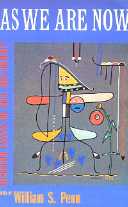 | Title: As we are now: mixblood essays on race and identity Author: Penn, W. S 1949- Published: University of California Press, 1998 Subjects: Ethnic Studies | Native American Studies | American Studies | Cultural Anthropology | Social Problems | United States History Publisher's Description: The thirteen contributors to As We Are Now invite readers to explore with them the untamed territory of race and mixblood identity in North America. A "mixblood," according to editor W.S. Penn, recognizes that his or her identity comes not from distinct and separable strains of ancestry but from the sum of the tension and interplay of all his or her ancestral relationships. These first-person narratives cross racial, national, and disciplinary boundaries in a refreshingly experimental approach to writing culture. Their authors call on similar but varied cultural and aesthetic traditions - mostly oral - in order to address some aspect of race and identity about which they feel passionate, and all resist the essentialist point of view. Mixblood Native American, Mestizo/a, and African-American writers focus their discussion on the questions indigenous and minority people ask and the way in which they ask them, clearly merging the singular "I" with the communal "we." These are new voices in the dialogue of ethnic writers, and they offer a highly original treatment of an important subject. [brief] Similar Items |
| 12. | 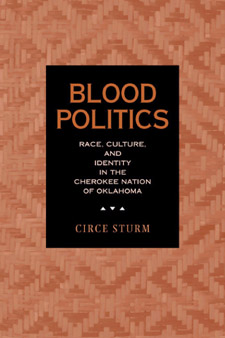 | Title: Blood politics: race, culture, and identity in the Cherokee Nation of Oklahoma Author: Sturm, Circe 1967- Published: University of California Press, 2002 Subjects: Anthropology | Cultural Anthropology | Native American Studies | Native American Ethnicity | African American Studies Publisher's Description: Circe Sturm takes a bold and original approach to one of the most highly charged and important issues in the United States today: race and national identity. Focusing on the Oklahoma Cherokee, she examines how Cherokee identity is socially and politically constructed, and how that process is embedded in ideas of blood, color, and race. Not quite a century ago, blood degree varied among Cherokee citizens from full blood to 1/256, but today the range is far greater--from full blood to 1/2048. This trend raises questions about the symbolic significance of blood and the degree to which blood connections can stretch and still carry a sense of legitimacy. It also raises questions about how much racial blending can occur before Cherokees cease to be identified as a distinct people and what danger is posed to Cherokee sovereignty if the federal government continues to identify Cherokees and other Native Americans on a racial basis. Combining contemporary ethnography and ethnohistory, Sturm's sophisticated and insightful analysis probes the intersection of race and national identity, the process of nation formation, and the dangers in linking racial and national identities. [brief] Similar Items |
| 13. | 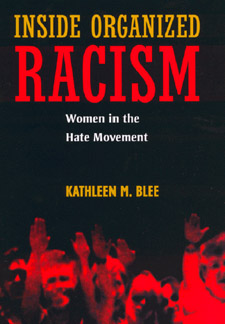 | Title: Inside organized racism: women in the hate movement Author: Blee, Kathleen M Published: University of California Press, 2002 Subjects: Sociology | Gender Studies | Social Problems | Public Policy | Christianity Publisher's Description: Kathleen M. Blee's disturbing and provocative look at the hidden world of organized racism focuses on women, the newest recruiting targets of racist groups and crucial to their campaign for racial supremacy. Through personal interviews with women active in the Ku Klux Klan, neo-Nazi groups, Christian Identity sects, and white power skinhead gangs across the United States, Blee dispels many misconceptions of organized racism. Women are seldom pushed into the racist movement by any compelling interest, belief, or need, she finds. Most are educated. Only the rare woman grew up poor. Most were not raised in abusive families. Most women did not follow men into the world of organized racism. Inside Organized Racism offers a fascinating examination of the submerged social relations and the variety of racist identities that lie behind the apparent homogeneity of the movement. Following up her highly praised study of the women in the 1920s Ku Klux Klan, Blee discovers that many of today's racist women combine dangerous racist and anti-Semitic agendas with otherwise mainstream lives. Few of the women she interviews had strong racist or anti-Semitic views before becoming associated with racist groups. Rather, they learned a virulent hatred of racial minorities and anti-Semitic conspiratorial beliefs by being in racist groups. The only national sample of a broad spectrum of racist activists and the only major work on women racists, this well-written and important book also sheds light on how gender relationships shape participation in the movement as a whole. [brief] Similar Items |
| 14. | 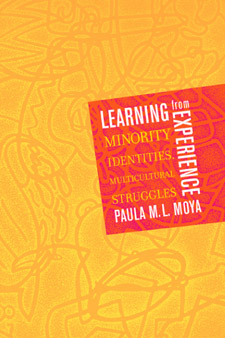 | Title: Learning from experience: minority identities, multicultural struggles Author: Moya, Paula M. L Published: University of California Press, 2002 Subjects: Literature | American Studies | Ethnic Studies | Chicano Studies | Gender Studies | Social and Political Thought | Politics | Social Theory | Immigration Publisher's Description: In Learning from Experience, Paula Moya offers an alternative to some influential philosophical assumptions about identity and experience in contemporary literary theory. Arguing that the texts and lived experiences of subordinated people are rich sources of insight about our society, Moya presents a nuanced universalist justification for identity-based work in ethnic studies. This strikingly original book provides eloquent analyses of such postmodernist feminists as Judith Butler, Donna Haraway, Norma Alarcón, and Chela Sandoval, and counters the assimilationist proposals of minority neoconservatives such as Shelby Steele and Richard Rodriguez. It advances realist proposals for multicultural education and offers an understanding of the interpretive power of Chicana feminists including Cherríe Moraga, Gloria Anzaldúa, and Helena María Viramontes. Learning from Experience enlarges our concept of identity and offers new ways to situate aspects of race, gender, class, and sexual orientation in discursive and sociopolitical contexts. [brief] Similar Items |
| 15. | 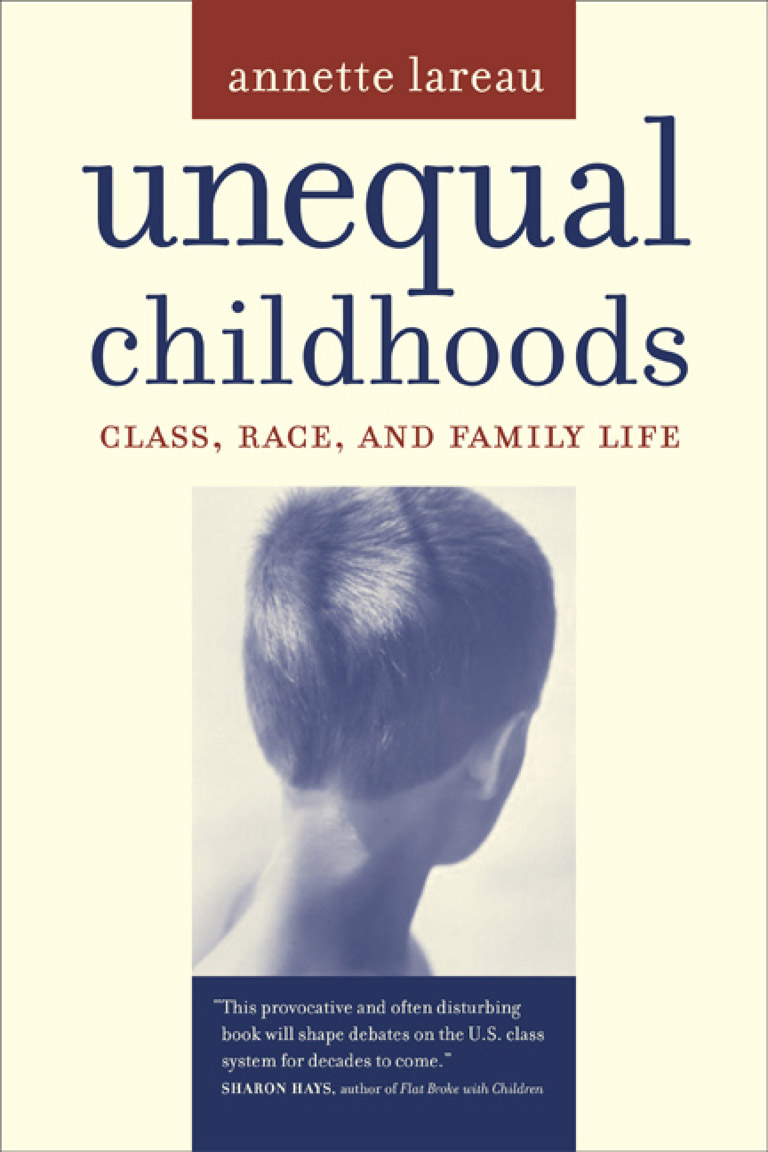 | Title: Unequal childhoods: class, race, and family life Author: Lareau, Annette Published: University of California Press, 2003 Subjects: Sociology | American Studies | Ethnic Studies | Anthropology | Education Publisher's Description: Class does make a difference in the lives and futures of American children. Drawing on in-depth observations of black and white middle-class, working-class, and poor families, Unequal Childhoods explores this fact, offering a picture of childhood today. Here are the frenetic families managing their children's hectic schedules of "leisure" activities; and here are families with plenty of time but little economic security. Lareau shows how middle-class parents, whether black or white, engage in a process of "concerted cultivation" designed to draw out children's talents and skills, while working-class and poor families rely on "the accomplishment of natural growth," in which a child's development unfolds spontaneously - as long as basic comfort, food, and shelter are provided. Each of these approaches to childrearing brings its own benefits and its own drawbacks. In identifying and analyzing differences between the two, Lareau demonstrates the power, and limits, of social class in shaping the lives of America's children. [brief] Similar Items |
| 16. | 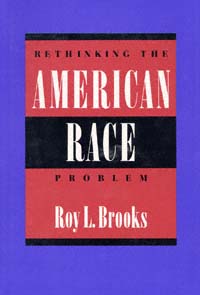 | Title: Rethinking the American race problem Author: Brooks, Roy L. (Roy Lavon) 1950- Published: University of California Press, 1990 Subjects: American Studies | Law | Politics | Ethnic Studies Publisher's Description: If the conservative view of the American race problem is frightening, the traditional liberal view seems impotent. Analyzing the race problem from neither right nor left, Brooks sheds a new and clarifying light on America's longest running social and moral dilemma.This incisive book provides a bold new examination of the seemingly intractable racial problems confronting Americans at the end of the twentieth century. In a wide-ranging and probing study, Brooks calls into question the prevailing wisdom about racism, civil rights legislation, and the composition of the Black community, going on to offer a dramatic new approach to the race problem. In Brooks' mind, civil rights laws - laws targeted at racial discrimination - have not only failed to engender racial equality, but have in fact had a negative effect on the standard of living of many Blacks. Brooks defines the American race problem so as to carefully separate racial oppression from (economic) class oppression and explains how civil rights legislation since the 1960s has hurt Black Americans of every class. He offers a strategy for resolving the country's racial inequities, unique in its attentiveness to class division in Black society, that combines governmental remedies and an unprecedented program of Black self-help.While Brooks argues that the government has the means to resolve the race dilemma, he suggests that it lacks the spirit to do so. Thus, it may be time for Black Americans to come to grips with an unpleasant reality - namely, that they can count on the government only for minimal alleviation, and must take on the larger portion of responsibility for resolving the American race problem themselves.Certain to arouse controversy, Rethinking the American Race Problem offers new understandings of issues often clouded by misconceptions and backward notions. It is an important book for anyone concerned about the current state of race relations in America. [brief] Similar Items |
| 17. | 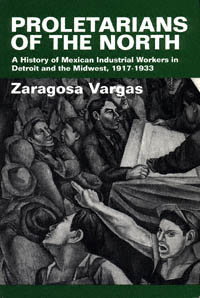 | Title: Proletarians of the North: a history of Mexican industrial workers in Detroit and the Midwest, 1917-1933 Author: Vargas, Zaragosa Published: University of California Press, 1993 Subjects: History | United States History | Latino Studies | Chicano Studies Publisher's Description: Between the end of World War I and the Great Depression, over 58,000 Mexicans journeyed to the Midwest in search of employment. Many found work in agriculture, but thousands more joined the growing ranks of the industrial proletariat. Throughout the northern Midwest, and especially in Detroit, Mexican workers entered steel mills, packing houses, and auto plants, becoming part of the modern American working class.Zaragosa Vargas's work focuses on this little-known feature in the history of Chicanos and American labor. In relating the experiences of Mexicans in workplace and neighborhood, and in showing the roles of Mexican women, the Catholic Church, and labor unions, Vargas enriches our knowledge of immigrant urban life. His is an important work that will be welcomed by historians of Chicano Studies and American labor. [brief] Similar Items |
| 18. | 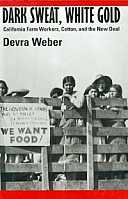 | Title: Dark sweat, white gold: California farm workers, cotton, and the New Deal Author: Weber, Devra 1946- Published: University of California Press, 1994 Subjects: History | Californian and Western History | Latino Studies | Labor Studies | California and the West | African History Publisher's Description: In her incisive analysis of the shaping of California's agricultural work force, Devra Weber shows how the cultural background of Mexican and, later, Anglo-American workers, combined with the structure of capitalist cotton production and New Deal politics, forging a new form of labor relations. She pays particular attention to Mexican field workers and their organized struggles, including the famous strikes of 1933.Weber's perceptive examination of the relationships between economic structure, human agency, and the state, as well as her discussions of the crucial role of women in both Mexican and Anglo working-class life, make her book a valuable contribution to labor, agriculture, Chicano, Mexican, and California history. [brief] Similar Items |
| 19. | 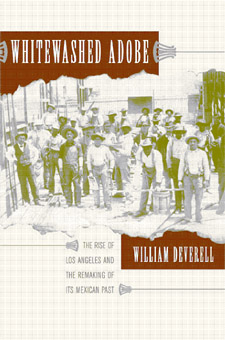 | Title: Whitewashed adobe: the rise of Los Angeles and the remaking of its Mexican past Author: Deverell, William Francis Published: University of California Press, 2004 Subjects: History | Californian and Western History | Chicano Studies | American Studies | Urban Studies Publisher's Description: Chronicling the rise of Los Angeles through shifting ideas of race and ethnicity, William Deverell offers a unique perspective on how the city grew and changed. Whitewashed Adobe considers six different developments in the history of the city - including the cementing of the Los Angeles River, the outbreak of bubonic plague in 1924, and the evolution of America's largest brickyard in the 1920s. In an absorbing narrative supported by a number of previously unpublished period photographs, Deverell shows how a city that was once part of Mexico itself came of age through appropriating - and even obliterating - the region's connections to Mexican places and people. Deverell portrays Los Angeles during the 1850s as a city seething with racial enmity due to the recent war with Mexico. He explains how, within a generation, the city's business interests, looking for a commercially viable way to establish urban identity, borrowed Mexican cultural traditions and put on a carnival called La Fiesta de Los Angeles. He analyzes the subtle ways in which ethnicity came to bear on efforts to corral the unpredictable Los Angeles River and shows how the resident Mexican population was put to work fashioning the modern metropolis. He discusses how Los Angeles responded to the nation's last major outbreak of bubonic plague and concludes by considering the Mission Play, a famed drama tied to regional assumptions about history, progress, and ethnicity. Taking all of these elements into consideration, Whitewashed Adobe uncovers an urban identity - and the power structure that fostered it - with far-reaching implications for contemporary Los Angeles. [brief] Similar Items |
| 20. | 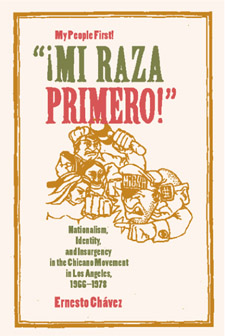 | Title: "Mi raza primero!" (My people first!): nationalism, identity, and insurgency in the Chicano movement in Los Angeles, 1966-1978 Author: Chávez, Ernesto 1962- Published: University of California Press, 2002 Subjects: History | California and the West | Californian and Western History | Chicano Studies | Sociology | Politics | Social Problems | Immigration Publisher's Description: ¡Mi Raza Primero! is the first book to examine the Chicano movement's development in one locale - in this case Los Angeles, home of the largest population of people of Mexican descent outside of Mexico City. Ernesto Chávez focuses on four organizations that constituted the heart of the movement: The Brown Berets, the Chicano Moratorium Committee, La Raza Unida Party, and the Centro de Acción Social Autónomo, commonly known as CASA. Chávez examines and chronicles the ideas and tactics of the insurgency's leaders and their followers who, while differing in their goals and tactics, nonetheless came together as Chicanos and reformers. Deftly combining personal recollection and interviews of movement participants with an array of archival, newspaper, and secondary sources, Chávez provides an absorbing account of the events that constituted the Los Angeles-based Chicano movement. At the same time he offers insights into the emergence and the fate of the movement elsewhere. He presents a critical analysis of the concept of Chicano nationalism, an idea shared by all leaders of the insurgency, and places it within a larger global and comparative framework. Examining such variables as gender, class, age, and power relationships, this book offers a sophisticated consideration of how ethnic nationalism and identity functioned in the United States during the 1960s and 1970s. [brief] Similar Items |